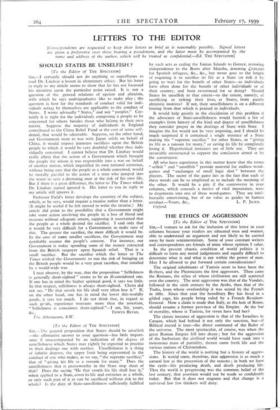[To the Editor of THE SPECTATOR] SIR, — The general proposition that
States should be unselfish —the affirmative answer to your question—has little import- ance if unaccompanied by an indication of the degree of unselfishness which States may rightly be expected to practise in their dealings one with another. Unselfishness is a thing of infinite degrees, the upper limit being represented in the conduct of one who makes, as we say, " the supreme sacrifice," that of " giving his life as a ransom for many." Does the unselfishness that is praiseworthy in the State stop short of that? Does the saying "He that saveth his life shall lose it," when applied to a State, cover its life and existence as a whole, or only such part of it as can be sacrificed without risk to the whole? Is the duty of State-unselfishness sufficiently fulfilled
by such acts as ceding the Ionian Islands to Greece, restoring independence to the Boers after Majuba, donating £12o,000 for Spanish refugees, &c., &c., but never goes to the length of requiring it to sacrifice its life as a State (or risk it by going to war) for the benefit of other States—as individuals have often done for the benefit of other individuals or of their country, and been reverenced for so doing? Should States be unselfish to that extent—to the extent, namely, of sacrificing or risking their lives, as States, from purely altruistic motives? If not, their unselfishness is on a different footing from that which is praised in individuals.
It would help greatly in the elucidation of this problem if the advocates of State-unselfishness would furnish a list of examples from history of the kind and degree of unselfishness they consider proper in the dealings of State with State. I imagine the list would not be very imposing, and I should be much surprised if it contained a single instance of a State making the " supreme sacrifice " for other States, or " giving its life as a ransom for many," or saving its life by completely losing it. Hypothetical instances are of little use. They are invariably constructed to support the conclusion aimed at by the constructor.
All who have experience in this matter know that the terms " selfish " and " unselfish " provide material for endless word- games and " exchanges of small logic shot " between the players. The secret of the game lies in the fact that each of these words can be so employed as to include the meaning of the other. It would be a pity if the controversy in your columns, which conceals a matter of vital importance, were to degenerate into one of these word-games. They are intel- lectually entertaining, but of no value as guides to human










































 Previous page
Previous page